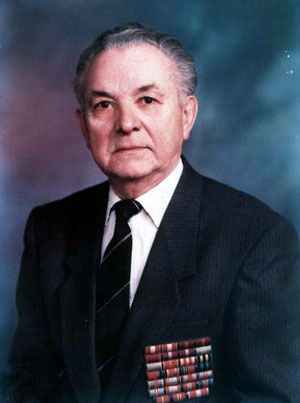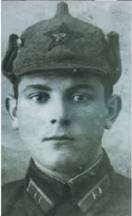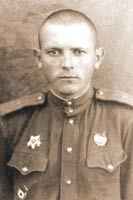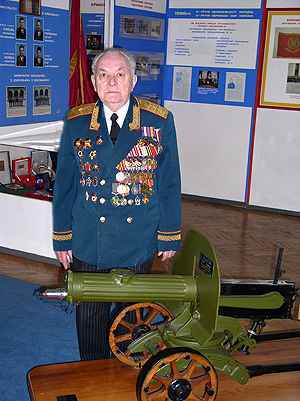Mytrofan Chernykh

Mytrofan Chernykh was born on September 7, 1921. In the family of peasants were five more children.
Despite the poor childhood, Mytrofan Chernykh finished 10 forms of a secondary school and went to a college. After graduating from the college with excellent marks, in June 1939 he arrived at a reception center.

An event at the reception center changed the life of the young man. A border guard officer addressed Mytrofan with a proposal to join a military school. For him – a guy from a large and impoverished family – it was a lucky chance to get such a start. So, in July 1939, Mytrofan Chernykh became a cadet of Orel Border Guard School, which he finished on June 10, 1941.
Within five days after the graduation, Lieutenant Chernykh took command of the second permanent strong point in Brest fortified area.
On June 22, 1941, his subordinates managed to deter the offensive of the enemy in their sector. But by the end of the first day of the war, Lieutenant Chernykh received an order to blow up stationary weapons and move away. On the same day he was wounded for the first time.
Heavy defensive battles and retreat to Smolensk followed. It is here where Mytrofan Chernykh’s service in the system of the military intelligence began – he was appointed as a leader of the reconnaissance platoon of the reconnaissance battalion of 56th rifle division. But he didn’t have time to take command because he was urgently summoned to the intelligence section of the HQ of the Western Front and then sent to Moscow at the command of the Chief of Intelligence Department of the General Staff of the Red Army. This department was in charge of manning and training of the sabotage-reconnaissance groups (SRG) for actions in the rear of the enemy. One of these groups was headed by Mytrofan Chernykh. Due to lack of time for training, main efforts were put on theory. After receiving a combat task, the SRG under command of Lieutenant Chernykh was airlifted to Orsha in the area of Svitski marshes.
The task of the group was to conduct reconnaissance of the German forces and carry out subversive actions. In particular, Lieutenant Chernykh’s group blew up two bridges, a railway crossing, captured and transported a German Colonel with important documents behind the front line.

Mytrofan Chernykh spent three years in the enemy’s rear – until autumn of 1944. During this time, his group completed missions on the territory of Belarus, the Baltic States and Ukraine. By the end of 1944, after another heavy wound Captain Chernykh was appointed as a commander of the reconnaissance battalion. In March 1945, Major Chernykh assumed command of a reconnaissance battalion of 1st Ukrainian Front. This was his position in Koenigsberg when he greeted victory.
After a brief vacation in July 1945, M. Chernykh was sent for training to the Intelligence Faculty of the Military Academy, where, in addition to other subjects, he studied Turkish and Persian languages. Moreover, he took optional classes in English, and he was the only one to defend the thesis in English.
After graduating in 1947 from the Academy with honours diploma, Lieutenant Colonel Chernykh was appointed as the chief of intelligence of the division in the Lenkoran city of the Azerbaijan of the Transcaucasian military district. But he did not serve there for a long time. Excellent language skills and extensive intelligence experience were noticed. Already in the beginning of 1948 Mytrofan Chernykh was summoned for an interview for admission to the Military Academy of the Soviet Army, which prepared the specialists of human intelligence and military diplomats.
Training at the Academy was interesting and extremely tough. Everything that can be beneficial to a HUMINT specialist for task completion was taught. In the fourth year of the Academy, Mytrofan Chernykh was deliberately trained to perform specific tasks. He had to study the life and customs of the peoples of the East, memorizing every detail. He even mastered the skills of a ... shoeblack, even traveled to Azerbaijan for training.
By the moment of graduation from the Academy, Mytrofan Chernykh had not even turned thirty but he was promoted to the rank of Colonel. A long-term tour of duty to Iran was in his future.
To “cover the traces” he reached the destination using bypasses and frequently changing his appearance and documents. Arriving in Tehran, he started to carry out the task. After three years of illegal work, he began to notice increasing interest to himself and same faces around. When he reported this to Moscow, the answer was short: “Return immediately”.
However, it was impossible to do it right away: unnotified communication agents and agents could become easy victims of the Iranian counterintelligence. To leave them to their fate he had neither professional nor moral right. Curbing and conservation of the HUMINT network took a week. And this was enough to have him arrested a few hours before departure.
In a prison for dangerous special offenders in eastern Iran he spent nearly three years. M. Chernykh accused of espionage and sentenced to death. While he was expecting execution of the sentence, pneumonia started. During medical examination, the prison doctor noticed many scars from wounds on his body. It meant that he arrived in Iran from a country where combat actions were happening. So his real origin was established.
Long negotiations between the Governments of Iran and the USSR started. It should be noted that at that time relations between the two countries were relatively friendly. The Iranian leaders did not want to spoil them because of one spy but still the sides failed to reach an agreement on exchange.
While haggling continued, the Soviet military intelligence asset bribed prison guards. And somehow one night he was thrown over the fence of the prison and showed the direction to the Soviet border.
From memories of Mytrofan Chernykh: “I remember the heat... I did not know when and where I'll cross the border. Whether I reach it at all... I had to go at night and during the day I was hiding. The prison boots fell apart very soon and instead of them I used pieces of clothing. I ate lizards, snakes, birds and constantly felt thirsty. It was a dry August – there was no dew even in the morning…
I covered over a hundred kilometers during a week and finally came to the state border. At night, after digging under the outer fence, I crawled under it. But I hit a sensor for the security system, and by the second fence, a border patrol with a dog was already expecting me. I could only whisper quietly: “Take me…”.
A helicopter for transportation to Ashgabat arrived in the morning, M. Chernykh spent there a few days until representatives of the Main Intelligence Department arrived to accompany him to Moscow, where the Order of the Red Banner was bestowed on Colonel Chernykh for completing special tasks. Mytrofan Chernykh was not allowed to talk until the last minute of his life about the results of his trip in Iran...
From 1957 to 1966 he held various positions in Zakavkazkyi military district. In 1966 he was transferred to the Group of Soviet Forces in Germany as the Deputy Head of Intelligence of the Group of Soviet Forces in Germany responsible for HUMINT.

In 1971, Colonel Chernykh was appointed to the position of the Chief of Intelligence of Kiev military district. In December 1972, he was promoted to the military rank of Major General, and in 1975 he was appointed as military attaché of the Soviet Union to Turkey. An experienced General who spoke Turkish perfectly was quickly recognized by the military, political and cultural figures of Turkey, as well as military representatives of other countries. He was elected as a senior (doyen of the diplomatic corps) among the military attachés. By the way, this is the only case when a representative of the USSR was elected as doyen of the diplomatic corps in a NATO country.
In 1981, Mytrofan Chernykh returned home and resigned, and in 1982 he retired from the Armed Forces, where was bestowed with eleven orders and over thirty medals.
But Chernykh officer dynasty continues: his two sons are generals of the Armed Forces of Ukraine, his grandson also serves in the system of military intelligence of Ukraine. After retirement Mytrofan Chernykh headed the International Department of the Council of Trade Unions of Ukraine.

One week after the accident at Chernobyl nuclear power plant he was working along with German specialists at the destroyed reactor.
When Ukraine gained independence the Academy of the Armed Forces of Ukraine began to develop and his experience of professional intelligence officer was required there. For many years he successfully worked as Assistant Professor of the Chair of Intelligence. Until the last day of his life, M. Chernykh shared his experience with the younger generation of Ukrainian intelligence specialists. More than several hundreds of young intelligence specialists gratefully remember every minute spent with him and are proud to benefit from the opportunity to talk to the legend of intelligence – Mytrofan Chernykh.
Defence Intelligence of Ukraine pays a lot of attention to commemoration of the outstanding specialist. In 2009, the Memorial Room of Mytrofan Chernykh was inaugurated, where a unique exposition devoted to the life and professional activities of the legendary intelligence officer was presented.